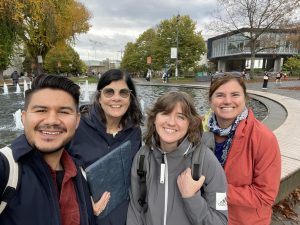
EDGES member Rona MacNicol has successfully completed her MA degree from UBC’s Institute for Resources, Environment and Sustainability. Congrats, Rona! Her master’s thesis is titled “Coping together?: Metro Vancouver tenant’s engagement with mutual aid during extreme heat events“.
Master’s Thesis Abstract:
Multiple factors coalesce to make some communities more at risk than others during extreme heat events. Tenants are one such community for whom this might be the case. This research investigated how tenants in Metro Vancouver engage with mutual aid in response to extreme heat events by conducting focus groups, expert interviews, and oral histories with tenants and grassroots organizations. The findings reveal that mutual aid emerges as a way for tenants to meet their immediate needs, exercise agency and build connections when they experience ongoing risk to extreme heat due to structural and infrastructural conditions. Yet, existing mutual aid efforts risk placing unsustainable pressures on people’s time and energy and unevenly distributing the acts of care. While institutional involvement with mutual aid can improve resourcing, such involvement may also bureaucratize and centralize mutual aid. This does not mean that institutions do not have a role to play in supporting mutual aid networks. Nevertheless, institutions’ involvement with mutual aid risks reducing the efficacy of mutual aid, which is understood to work best when localized, decentralized, and horizontally organized. The research suggests that the future strength of mutual aid will lie in its wider, primarily grassroots, adoption. This can be facilitated through direct actions and relationship building. The existing blueprint of tenant organizing and the relatability of feeling too hot have the potential to grow mutual aid networks. Coupled with government supports such as a legal right to cooling, and affordable housing, strengthened mutual aid can make people safer and more secure during extreme heat events and in the face of other future climate impacts.